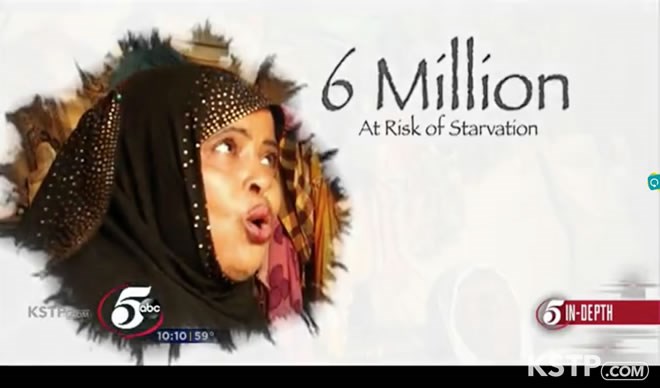
Tuesday May 23, 2017
By Farrah Fazal

Click here to watch the KSTP In-Depth special
The clock is ticking and the lives of children are hanging in the balance, as the worst famine since World War II is stealing lives in the Horn of Africa.
The Secretary General of the United Nations told world leaders in London a few weeks ago that he is asking for another $900 million to go to humanitarian workers to aid people during a drought that's getting worse.
It's a humanitarian crisis that goes far beyond hunger, and is most apparent in refugee camps across Africa. In Kismayo, a near-blind grandmother heard Fatuma Ibrahim's cries of labor and delivered a baby rushing into what is there a cruel world. He's only a few hours old, and already surrounded by unspeakable suffering. A grandmother's helping hands are the only saving grace here.
"No food, nothing. We didn't have anything to eat, we had hunger," said Fatuma's husband. He carried their two children, and a third walked with them as they made their way to Kismayo over two long days in the heat and two long nights through the dangers of the dark.
Six million people like Fatuma and her family are at risk for starving to death.
"As the drought goes on, people will become very weak to reach any area of help," said refugee commissioner Maryam Omar.
Omar and a reporter visited a parking lot in the middle of Kismayo to see the families who are the lucky ones. They survived their journeys.
"People die, children die – mother, she watch her kids dying," Omar said.
Some said they watched parents give urine to their children to keep them alive long enough to get to Kismayo. Fatuma's husband said Al Shabaab terrorists took their goats and land and left them with nothing.
Another mother said she traveled 100 miles to escape the famine and drought. She said she couldn’t carry both of her paralyzed children, and at one point had to decide which one she would leave behind. Her decision never became a reality, because a man in a donkey cart took her and her children the rest of the way to Kismayo.
It's a race against time to save lives here. A humanitarian agency based in Minneapolis is trying to save lives in Somalia by delivering food and water to people who need it most. The American Refugee Committee is the only agency with a country office in Somalia.
Their work is vital. Hundreds of thousands of vulnerable people are on the move across Somalia to find food and water. Omar says many of them are ending up in Kismayo.
"We don't know what to do. We have a war everywhere, we have Al Shabaab, we have international community that are not helping these people," she said.
The humanitarian crisis is compounded by Somalia's neighbor. The Kenyan government is sending 2,000 refugees back to Somalia every week. They want to shut down the world's second-largest refugee camp called Dadaab. The majority of the refugees are Somali.
The Minister of State for the Presidency, Mohamed Hassan, said, "We are in the worst situation we could be.” The majority of refugees coming from Dadaab are children. "We were pleading with the Kenyan government: with a drought, this is the worst time to return the people – it’s just like dumping people," he said.
He also said the Kenyan government won't slow the return of Somalis to Somalia. Hassan said he has nowhere to house the at least 50,000-plus people packed into streets and parking lots and refugee camps in Kismayo. Massive outbreaks of malaria, measles and cholera are sweeping through the refugee camps.
Ten-year-old Abd is in one of the camps and has an advanced stage of measles. His grandmother couldn't get him medication. He may not live to see many more birthdays.
Children are on their last breaths in hospitals across Somalia.
Dr. Yuself Ali works at a small hospital in Somaliland in Northern Somalia. He said he can't save children fast enough.
"We are losing them,” he said. “There are so many unreported cases. We are losing them."
Ali doesn't have ambulances to send to rural areas to pick up dying children. Humanitarian workers can't get in to deliver food and water to those children, either.
"Even the government cannot reach to those areas because Al-Shabaab is strong in those areas," Omar said.
It's a lost race against starvation for the children nobody can reach. The United Nations said terrorists kidnapped 13 humanitarian workers carrying food and vaccines in April.
Brigadier General Jon Jensen was the deputy commanding general of the U.S. Army Africa. He travelled across the continent and saw life beyond hunger.
"If we do nothing, the end stage is radicalization and more violent extremists," Jensen said.
He said famine creates instability. It's an opportunity for terrorists to recruit starving people by giving them food and water in return for their loyalty.
He said the U.S. must help the starving and dying. To people who ask him why the country should help when there is hunger and poverty in America, Jensen said, "Help the people closest to you, there's nothing wrong with that, this is not an either-or. It can be both."